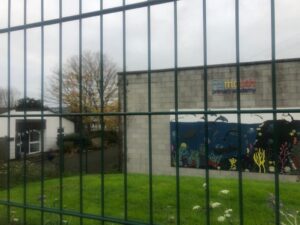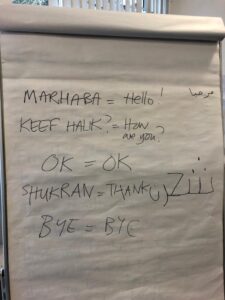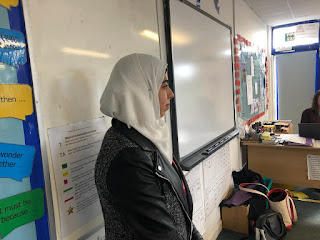
A valuable morning at
Falmouth Primary School in west Cornwall this morning with the wonderful Rawda Alater, who spoke about her life in Syria and her subsequent experience in the UK. She answered children's questions - and even taught a bit of Arabic.
 In at least two classes there were Arabic speakers. In one, a child from Saudi Arabia spoke no English at all and was delighted to be able to chat with Rawda. As the rest of us listened, we realised what it must feel like to be 'the one' who doesn't understand. It's a strange and disconcerting experience - and one that non-English speaking children must come up against when they first arrive here.
In at least two classes there were Arabic speakers. In one, a child from Saudi Arabia spoke no English at all and was delighted to be able to chat with Rawda. As the rest of us listened, we realised what it must feel like to be 'the one' who doesn't understand. It's a strange and disconcerting experience - and one that non-English speaking children must come up against when they first arrive here.
Rawda spoke about the difference between schools in this country and in Syria. In Syria, children don't have hot dinners at school. The opposite - they take a packed lunch of flat bread and maybe cheese. Houses don't have curtains and carpets. It's hot. Life is different.
Rawda explained how she felt when she arrived as a refugee in Truro from Lebanon, where she'd been living for five years since she left the war in Syria in 2010.
 She was afraid to open the door, she said, because she didn't understand a word of English.
She was afraid to open the door, she said, because she didn't understand a word of English.
Together this morning we learned how to say hello, how are you! And with the help of Arabic speaking pupils, wrote a few words in Arabic on the flip chart.
 Back at Falmouth Primary School today for a further assembly and classroom workshops in Arabic with the wonderful Rawda Alater, who arrived in Truro from Lebanon and Syria about six years ago.
Back at Falmouth Primary School today for a further assembly and classroom workshops in Arabic with the wonderful Rawda Alater, who arrived in Truro from Lebanon and Syria about six years ago.


%20(1).jpg)